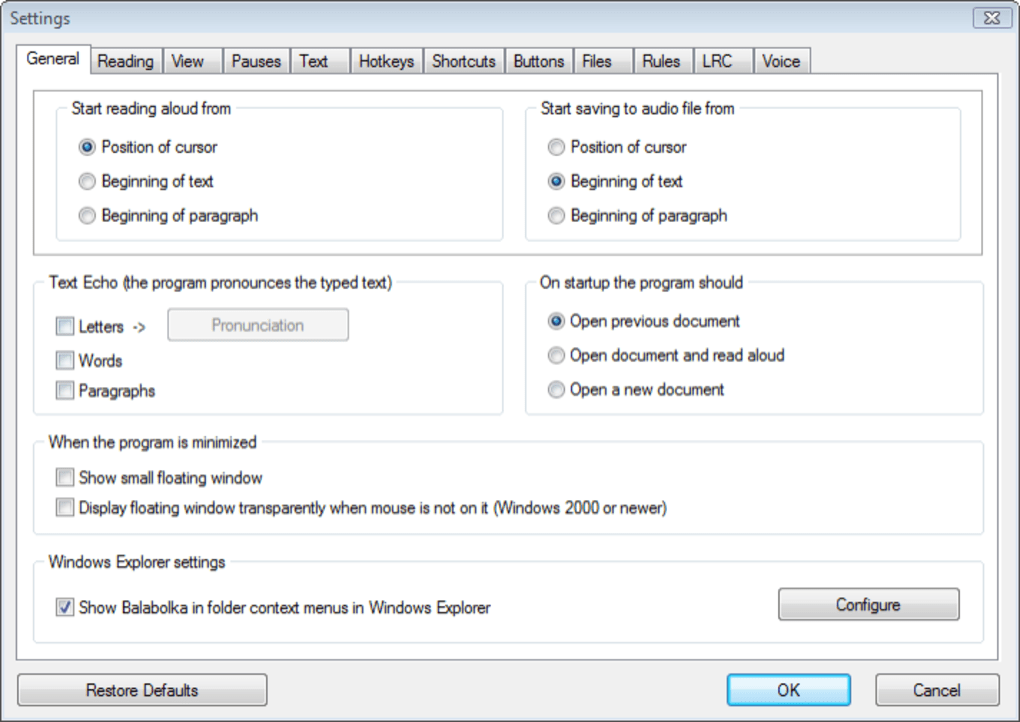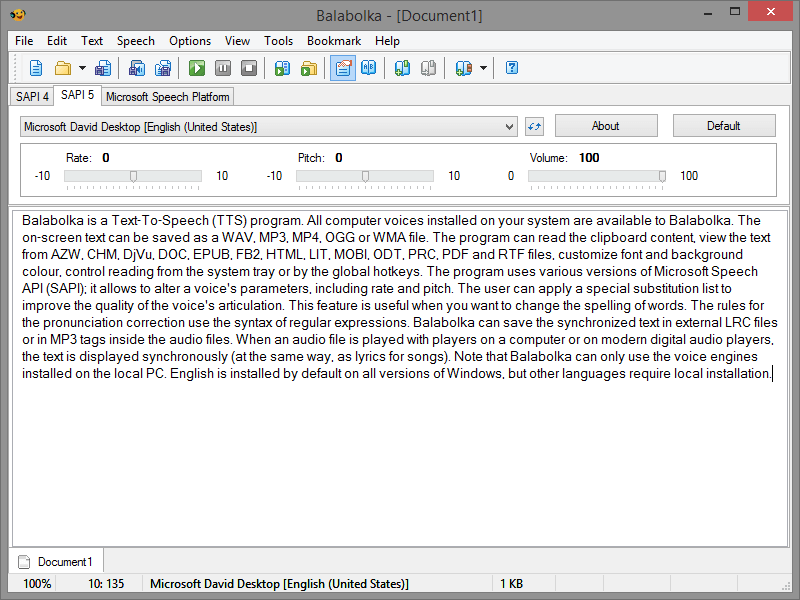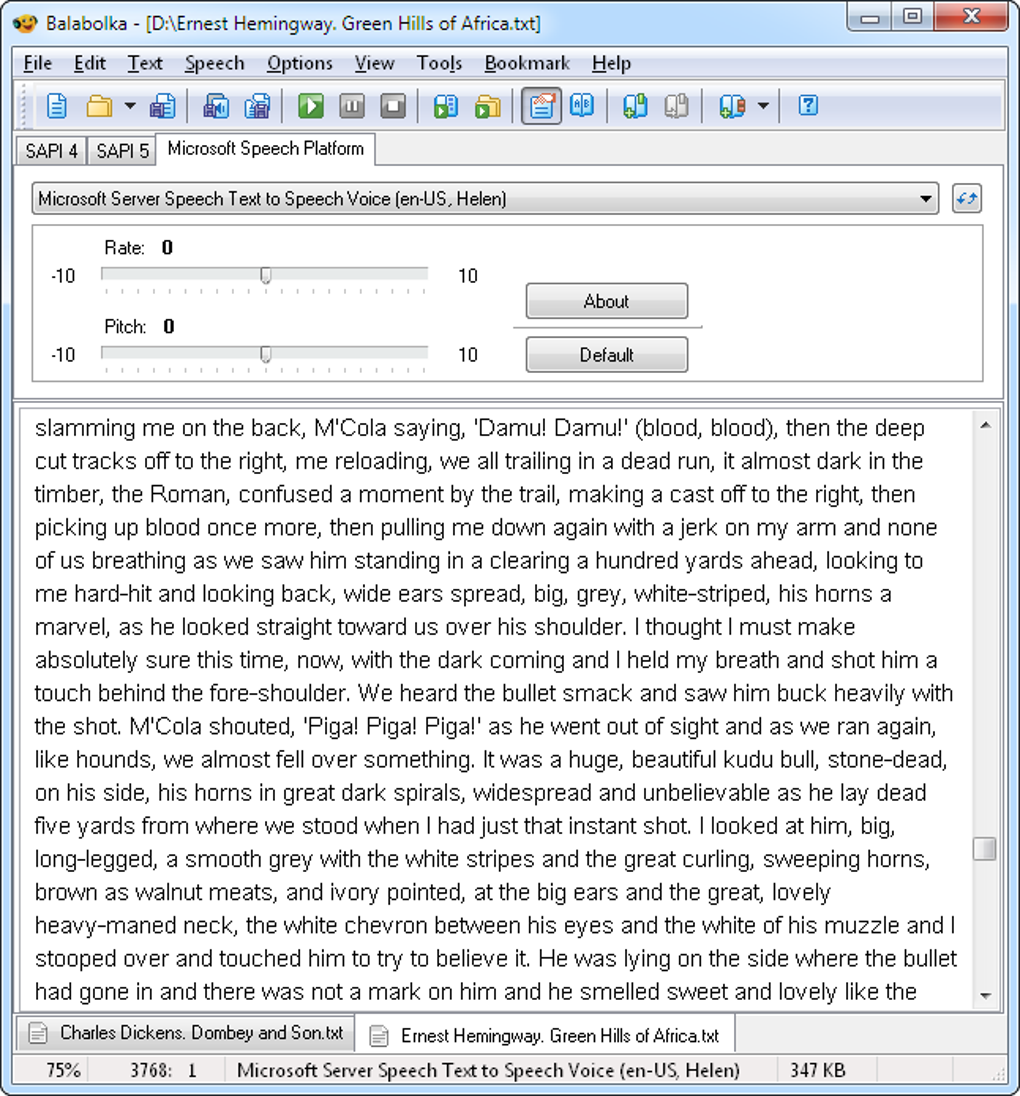Balabolka Frequently Asked Questions. If you want to help Balabolka, you might draw bitmap images with sizes 32 x 32 or 48 x 48 for buttons (use the images from the resources subfolder). Or you might translate sample.txt from the languages subfolder.
Balabolka is a Text-To-Speech (TTS) program. All computer voices installed on your system are available to Balabolka. The on-screen text can be saved as an audio file. The program can read the clipboard content, extract text from documents, customize font and background colour, control reading from the system tray or by the global hotkeys. Balabolka supports text file formats: AZW, AZW3, CHM, DjVu, DOC, DOCX, EML, EPUB, FB2, FB3, HTML, LIT, MD, MOBI, ODP, ODS, ODT, PDB, PRC, PDF, PPT, PPTX, RTF, TCR, WPD, XLS, XLSX.
- Text to Speech । How to Add Deniel Voices in BalabolkaVoice 01: 02: http://www.mediafire.co.
- The user can apply a special substitution list to improve the quality of the voice's articulation. This feature is useful when you want to change the spelling of words. The rules for the pronunciation correction use the syntax of regular expressions. Balabolka can save the synchronized text in external LRC files or in MP3 tags inside the audio.
- Balabolka is a Text-To-Speech (TTS) program. All computer voices installed on your system are available to Balabolka. The on-screen text can be saved as a WAV, MP3, MP4, OGG or WMA file. The program can read the clipboard content, view the text from AZW, CHM, DjVu, DOC, EPUB, FB2, HTML, LIT, MOBI, ODT, PRC, PDF and RTF files, customize font and background colour, control.
- Text To Speech Software Arab Voice. Balabolka– Save text as a spoken audio file, with customizable voices– There are a couple of methods to utilize Balabolka’s free text to speech software application: you can either paste and copy text into the program, or you can open a number of supported file formats (including DOC, PDF, and HTML.
The program uses various versions of Microsoft Speech API (SAPI); it allows to alter a voice's parameters, including rate and pitch. The user can apply a special substitution list to improve the quality of the voice's articulation. This feature is useful when you want to change the spelling of words. The rules for the pronunciation correction use the syntax of regular expressions. Balabolka can save the synchronized text in external LRC files or in MP3 tags inside the audio files. When an audio file is played with players on a computer or on modern digital audio players, the text is displayed synchronously (at the same way, as lyrics for songs). |
| Size: MB | |
| Version:Changelog | |
| Licence: Freeware | |
| Operating System: |
Portable Balabolka does not require an installation and can be run from a USB drive.
A computer must have at least one voice installed.
The utility contains no graphical user interface and works only from the command line.
The application handles various command line parameters to be able to read text aloud or save as an audio file.
The program allows to extract text from the various types of files. The extracted text can be combined into one file or/and split into few files. The utility works from the command line, without displaying any user interface.
*Balabolka is a Russian word, it can be translated as 'chatterer'.
The program allows to use skins for customizing your window appearance.
Download Skin Pack (6.7 MB, 107 skins)
Balabolka can use the Microsoft Speech API 4.x/5.x voices and the Microsoft Speech Platform text-to-speech engines.

Use the fresh versions of speech engines.
RHVoice - free and open source speech synthesizer (it supports English, Esperanto, Georgian, Kyrgyz, Portuguese, Russian, Tatar and Ukrainian):
UkrVox - free Ukrainian voice created by Yaroslav Kozak (Lviv, Ukraine):

Ekho - free TTS engine (it supports Cantonese, Mandarin and Zhaoan Hakka):
Hear2Read - free voices for Indic languages (Gujarati, Hindi, Kannada, Marathi, Punjabi, Tamil, Telugu):
To get better voice quality, you can purchase commercial TTS engines.
High Quality Commercial Voices:
- Acapela Group (demo) - Infovox 4
- Alfanum (demo)
- Cepstral (demo)
- IVONA (demo)
- Nuance/Cerence (demo)
- ReadSpeaker (demo)
The Microsoft Speech Platform allows developers to build and deploy Text-to-Speech applications. The Microsoft Speech Platform consists of a Runtime, and Runtime Languages (engines for speech recognition and text-to-speech). There are separate Runtime Languages for speech recognition and speech synthesis. The version of the Runtime Languages must match the version of the Speech Platform that you installed.
Use the following steps to install the Microsoft Speech Platform (version 11.0):
- Download and install the Speech Platform Runtime
(the file 'x86_SpeechPlatformRuntimeSpeechPlatformRuntime.msi'). - Download and install Runtime Languages for use with the Speech Platform
(file names starting with 'MSSpeech_TTS_').
The Microsoft Speech Platform provides support for 26 languages for speech synthesis. XML tags can be used both for SAPI 5 and the Speech Platform.
Balabolka can use Hunspell (hunspell.github.io). Hunspell is the default spell checker of OpenOffice.org, LibreOffice and Mozilla Firefox.
Balabolka Arabic Voices

Spell checker dictionaries for Windows:
Balabolka can use language modules from Microsoft Office 97/2000 for spell checking. If Microsoft Office is not installed on your computer, or you use the other version of Microsoft Office, you can download spell checking components from my web-site:
Balabolka allows to use the spell checking built in operating system. The Spell Checking API is available beginning with the Windows 8.
| What is SAPI? |
| The Speech API (SAPI) is an application programming interface developed by Microsoft to allow the use of speech synthesis within Windows applications. The SAPI provides a high-level interface between an application and speech engines. Text-To-Speech software synthesizes text strings and files into spoken audio using synthetic voices. |
| Where can I get SAPI 4? |
| To use SAPI 4 voices, download and install the redistributable Microsoft Speech API 4.0 file. Also, you may download and install the Microsoft Speech Control Panel; the Speech Control Panel will add an icon to your Control Panel to enable you to list the compatible text-to-speech engines installed on your system and customize their settings for your use. |
| Where can I get SAPI 5? |
| Windows XP (and later versions) comes with SAPI 5. |
| How do I know what Text-To-Speech voices have been installed on the computer? |
| You can view all the voices available on the computer by following Control Panel->Speech->Speech Properties->Text To Speech->Voice selection. |
| Windows 10 has the new voices Microsoft Mark Mobile and Microsoft Zira Mobile, but they are not available in text-to-speech software. Is it possible to unlock the new voices? |
| By default, the Microsoft mobile voice is locked for using in text-to-speech software via SAPI 5. You can unlock it with a simple registry tweak. Download the archive, extract the file for your language and for your version of the operating system ('mobile_x86.reg' for 32-bit and 'mobile_x64.reg' for 64-bit), click the right mouse button on the file's name and choose the context menu item 'Merge'. The Microsoft mobile voice will appear in the list of the available voices in Balabolka. |
| My computer is running the 64-bit version of Windows. I have installed the 64-bit Runtime package for Microsoft Speech Platform and the English voices. But the list of available voices is still empty. Where is a problem? |
| Balabolka is the 32-bit application. You need to install the 32-bit Runtime package for Microsoft Speech Platform also. |
| What is Google Text-To-Speech? |
| In Google Translate you can find a 'Listen' button that converts text to speech. After pressing of this button a browser starts to download MP3 file. The service supports converting to speech texts not longer than 100 symbols. Balabolka allows to divide big text on small parts, create an audio file for each part and merge them together. |

| How do I change a voice during reading aloud? |
| Use the XML tags. It is recommended to write the opening and closing tags inside the same paragraph. For example: <voice required='Name=Microsoft Zira Desktop'>Hello, how are you?</voice> <voice required='Name=IVONA 2 Amy'>I am good.</voice> |
| I'm getting the error message 'OLE error 80045042'. What does that mean? |
| This error means: 'The XML parser failed due to bad syntax.' You must verify the syntax of the XML tags inside the text. Or, some part of the text looks like the start of an XML tag, and it is confusing SAPI. If you don't want to use XML tags, remove the symbols '<' and '>' from the text (or replace them by words 'less than' and 'greater than'). |
| How can I make a silent installation of Balabolka? |
| To install Balabolka in silent mode without dialogs you may use a silent installation. A silent installation is available by using -silent command-line switch. |
Download Tts Voices For Balabolka
| My computer contains two sound cards. How can I choose an audio device for text-to-speech playback? |
| You may select Speech in Control Panel of Windows and click the Audio Output button in the Speech Properties dialog box. Also, Balabolka contains the main menu item 'Options | Audio Output'. |

| I open a DjVu file, but the program doesn't show any text. What is wrong? |
| DjVu format was designed to store scanned documents. A DjVu file contains images of pages for books, magazines, etc. Also, DjVu can contain an OCR text layer. Balabolka can extract data from a text layer of DjVu only. If such layer is not available, the only way to get text is to use a text recognition system (for example, FineReader). |
| How can I remove dashes in the beginning of paragraphs? |
You should use the main menu item 'Edit | Replace'. Type ^p— in the Find what box and ^p in the Replace with box. The program allows to use most of special codes from Microsoft Word:
|
| I am not satisfied, how Balabolka extracts text from PDF files. Can I use the other way for processing of PDF? |
| The process of text extracting from PDF files is complicated enough, because PDF files do not contain plain text. You may use an external command-line utility for text extracting: for example, the program pdftotext.exe from the Xpdf project. Copy pdftotext.exe to the subfolder 'utils' in the folder of Balabolka, choose the main menu item 'Options | Text Import', the tab 'Custom Text Import', and click the Add button. Define the command for using of pdftotext.exe: %BFolder%utilspdftotext.exe -q -nopgbrk -enc UTF-8 %Input% %Output% Define the name of the converter (for example, 'Xpdf Converter'), file extension ('PDF') and output encoding ('UTF-8'). After activating of the option Use instead of default extracting method for this file type the program will be able to use the external utility for text extracting from PDF files. |
| How can every line of a text file be converted to a separate audio file? |
| You may add two empty lines after every line with text in the document. Open the file in Balabolka, choose the main menu item 'Edit | Replace', type ^p in the Find what box and ^p^p^p in the Replace with box, click the Replace all button. Choose the main menu item 'File | Split and Convert to Audio Files'; choose the split method 'by two empty lines in succession' and click the Split and Convert button. |
| Can I use the first line of text as the name of the audio file (for example, '01 Chapter One.mp3', '02 Chapter Two.mp3')? |
| Type %FirstLine% in the 'Base Output Filename' box in the window 'Split and Convert to Audio Files'. The application will replace this variable by the first line of each text part. To change the position of the sequence number inside the filename, use the %Number% variable. |
| What is Spritz-Reader? |
| Spritz is a a new speed-reading technology. It allows to speed reading rates anywhere from 100 to 1000 words per minute. The time consuming part of usual reading lies mainly in the actual eye movements from word to word and sentence to sentence. Spritz positions words in a spot on a display where you can recognize the word, without moving your eyes. |
| What is the IFilter interface? |
| The IFilter interface works with documents. It provides filters to extract information from proprietary file formats. Full-text search engines call the methods of the IFilter interface. IFilters are available for Adobe PDF, WordPerfect and many other popular file formats. You can get IFilter installers from respective vendors. IFilter.org is a good place to get started. Note that because Balabolka is the 32-bit application you may need to install the 32-bit version of IFilters. |
| Can I use media files generated with Balabolka in YouTube videos? |
| Balabolka is freeware, so you may create audio files for free. But if you use the commercial voices, you need to contact the developers of the voice and purchase the license for commercial use/audio broadcast. The audio distribution license will allow you to use speech in YouTube videos. For example, the information from the Cepstral web-site: 'Cepstral Personal voices are for personal use only and are NOT licensed for audio distribution. This means the audio you create is for your use only and cannot be shared with others or used in videos, presentations, or webpages. If you are interested in an audio distribution license, please contact sales.' |
| Is it possible to create a video file in Balabolka (containing speech as audio data and synchronized text as video data)? |
| No, Balabolka doesn't have such option. But you can get the similar result in another way. My application allows to create files in SRT and LRC formats. Use the main menu item 'Options | Audio Files' in Balabolka. On the tab 'LRC, SRT' you may define settings for subtitle files. The application will convert text to an audio file (for example, FILE.MP3) and create a subtitle file for this audio file (for example, FILE.SRT).
|
| I am creating a 3D character, and it is necessary to generate a lip animation synchronized with audio generated by a text-to-speech engine. Can you help me? |
| When a speech engine reads aloud, it generates information about visemes. A viseme is the basic visual unit of speech that represents the position of the mouth and face when pronouncing a phoneme. SAPI 5 supports the list of 21 visemes. The console application of Balabolka contains the command line parameter that allows to generate the output text file with visemes. The application will create the audio file and then read it aloud to get visemes and their timecodes. |